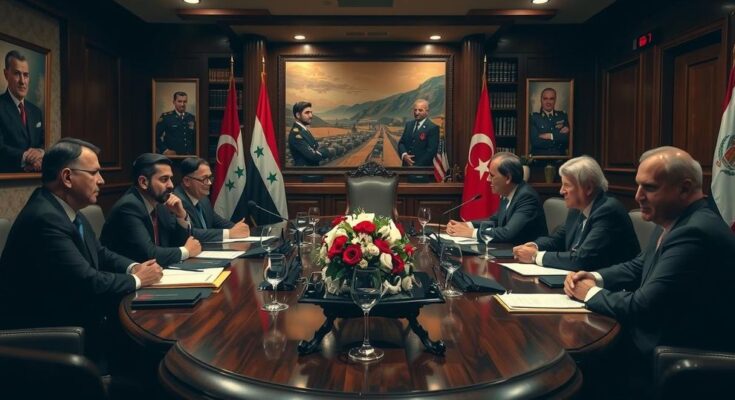Iran’s Foreign Minister Abbas Araghchi will visit Damascus to reinforce support for President Bashar al-Assad following Islamist insurgent advances that captured Aleppo. The Syrian regime, historically reliant on foreign allies like Iran and Russia, faces unprecedented challenges as conflicts escalate and regional powers respond. The U.S. and Israel are implicated in the recent territorial changes, despite their denials of involvement.
Iran’s Foreign Minister, Abbas Araghchi, is set to visit Damascus on Sunday to express Tehran’s unwavering support for President Bashar al-Assad’s regime amidst a significant offensive by Islamist insurgents, including Hayat Tahrir al-Sham (HTS), which recently seized Aleppo. This visit occurs as Syria’s allies and adversaries respond to the deteriorating situation in northern Syria. Araghchi reaffirmed support for the Syrian government, stating, “We firmly support the Syrian army and government,” as Assad faced the most substantial challenge to his rule in years.
In a dramatic turn of events, Assad had been absent from public life as militants rapidly gained control over territories in north-western Syria, culminating in the takeover of Aleppo, Syria’s second-largest city. The Syrian leader publicly re-emerged to connect with regional allies, assuring them that his government could fend off the insurgency with their assistance. Historically reliant on foreign military backing, including previous support from Russian airpower and Iranian ground forces, the regime is now facing escalating threats.
This escalation comes as Israel has increased airstrikes against Iranian positions in the region, signifying heightened tensions in the area. The Islamist advance has raised alarm among Assad’s international backers, leading Araghchi to claim that the United States and Israel were complicit in the militants’ gains. Concurrently, the U.S. dismissed these claims, emphasizing its lack of involvement and categorizing HTS as a terrorist organization.
As rebel groups, backed by Turkey, moved to fill the void left by retreating Syrian forces, reports emerged of fierce fighting and counter-offensives in the region. While the Syrian military conducted airstrikes in opposition-held areas, eyewitnesses reported civilian casualties from air attacks in Idlib, further intensifying the humanitarian crisis. The situation remains fluid as both sides brace for ongoing conflict, with the Syrian government pledging to recover lost territories.
The recent developments in Syria highlight the struggles faced by President Bashar al-Assad’s regime as Islamist insurgents advance, significantly challenging his authority. This conflict has deepened Syria’s reliance on foreign powers like Iran and Russia since the onset of the civil war in 2011. Aleppo’s fall signifies a critical moment in the ongoing civil war, revealing the complexities of international alliances and the shifting dynamics of power within the region, particularly in light of U.S. and Israeli involvement aimed at curtailing Iranian influence.
The visit of Iran’s top diplomat to Damascus underscores Tehran’s commitment to supporting the Assad regime in light of recent challenges posed by Islamist militants. This situation illuminates the fragility of Assad’s hold on power and the importance of foreign backing in sustaining his regime amid escalating violence and shifting territorial control in northern Syria. As battles continue and external tensions rise, the potential for further upheaval remains high.
Original Source: www.theguardian.com




